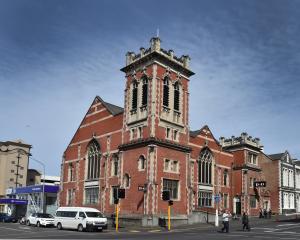Her day in Dunedin yesterday started off with meeting people from Te Kaika health service, and ended at the Centre of Digital Excellence, where she met innovators and entrepreneurs trying to build the new businesses of tomorrow.
"We already have policy work under way to start making changes to the way we operate in the future," she said.
"It won’t be based on case numbers, because you can have Covid cases in the community and your health system be OK. So we are already working on what the Covid protection frameworks will look like in the future and how we will manage future waves, particularly in the winter, preparation to narrow the use of mandates. We have said vaccine passes are less likely to be needed once we come out the other side."
Before New Zealand reached the other side, however, Covid hospital admission numbers would need to stabilise and medical staff would need to have their workloads eased, Ms Ardern said.

"Everyone is tired ... I would say that of our social services, our health services, even though unlike other countries we have not seen the direct impact of Covid to the same degree in our hospitals, we still have our health workforce in MIQ, doing vaccination, testing, and it has been a marathon effort.
"We will have other waves," Ms Ardern warned.
"We are preparing for multiple scenarios where we have other waves of Omicron, possibly waves of other variants, but we are adapting our approach so that each time, we hope that the impact to New Zealanders’ lives will lessen as we go.
Government policies such as border restrictions had kept previous variants out and stringent public health measures had kept Delta and then Omicron at bay for as long as possible, Ms Ardern said.
"I don’t want anyone to feel that it was for nothing. It was all important."
Ms Ardern said a range of providers had been funded, so anyone personally affected by Omicron should be able to get help, and business would be supported to survive the pandemic downturn.
"We have seen with other countries, even when you have higher caseloads, people change their behaviour but then they start to change it again after about six weeks, and we know we are unlikely to be different in that regard.
"We need to really support our businesses to get through that period but there is a strong likelihood that people, after a time, will become comfortable that the measures we have in place will keep them safe and they are likely to go out and about again.
"Simultaneous economic recovery is causing a huge increase in demand and limitations in supply, and those supply constraints are adding to inflation, and then you add in a war," Ms Ardern said.
"The war between Russia and Ukraine is hitting the world hard and New Zealand is not immune to that."
Ms Ardern said she hoped a range of measures due to come into effect shortly, including family tax credit changes, a minimum wage increase, the winter energy payment and adjustments to benefits, super and student support, would help struggling families.
"All of that, in the coming six weeks, we hope will make a difference."












